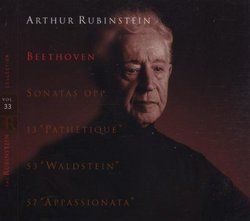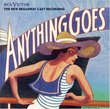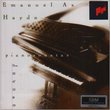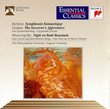| All Artists: Ludwig van Beethoven, Artur Rubinstein Title: Rubinstein Collection, Vol. 33 Members Wishing: 1 Total Copies: 0 Label: RCA Release Date: 7/10/2001 Album Type: Box set, Original recording remastered Genre: Classical Styles: Forms & Genres, Sonatas, Historical Periods, Classical (c.1770-1830), Modern, 20th, & 21st Century, Romantic (c.1820-1910), Symphonies Number of Discs: 1 SwapaCD Credits: 1 UPC: 090266303328 |
Search - Ludwig van Beethoven, Artur Rubinstein :: Rubinstein Collection, Vol. 33
 | Ludwig van Beethoven, Artur Rubinstein Rubinstein Collection, Vol. 33 Genre: Classical
|
Larger Image |
CD DetailsSimilarly Requested CDs
|
CD ReviewsClose, but no Cigar Hank Drake | Cleveland, OH United States | 10/10/2001 (3 out of 5 stars) "Volume 33 of RCA's Complete Arthur Rubinstein Collection includes the pianist's 1954 recordings of three of Beethoven's most popular Sonatas.Rubinstein made three recordings of the Pathetique Sonata (the only sonata to be given a name by the composer). The first one, recorded on 78RPM discs in 1946, was rather episodic and performed on an out of tune piano. This performance is a bit better, and so is the piano. The work comes across more as a whole than in the earlier version, with steadier tempos, less rubato, and greater pianistic clarity. However, Rubinstein's wholesale ignoring of Beethoven's dynamic markings in the first movement prevents this version from getting an absolute recommendation. His stereo remake from 1962 remains his best achievement in this piece.The Waldstein Sonata was peripheral to Rubinstein's repertoire, and this is his only recording of the work. The pianist seems strangely uncomfortable in the piece. Throughout the first movement, there are little hesitations and tempo changes which indicate that he had not really studied this piece in depth. Portions of the third movement drag, as if the pianist were tired. The end of this piece is home to one of the great Beethoven textual debates: in the score, the composer indicates that the pianist should play several runs as octave glissandi. Unfortunately, these are not really playable on modern pianos which have a much heavier touch than the pianos of Beethoven's time. Rubinstein, as did Vladimir Horowitz, plays the runs as prestissimo and staccato octaves. Rubinstein played the ubiquitous Appassionata Sonata more often in concert than any other Beethoven piece. This recording is a remarkable improvement over the pianist's almost comically slapdash 1946 version, which ignored the composer's tempo indications and left more notes out than it kept in. Tempo, pedaling, and phrasing are much more sensible here, yet the music loses nothing of its visceral excitement. Rubinstein also includes the third movement repeat which was skipped in the earlier version. Although different in details, this performance can be rated on about the same level as Rubinstein's 1963 stereo remake. The sound is some of the best Rubinstein received during the mono era, with none of the hardness heard in some other issues. Recommended for those dying to hear Rubinstein's Waldstein."
|

 Track Listings (9) - Disc #1
Track Listings (9) - Disc #1![Vivaldi's Ring of Mystery [With CD]](https://nationalbookswap.com/cd//m/30/0730/80730.jpg)








